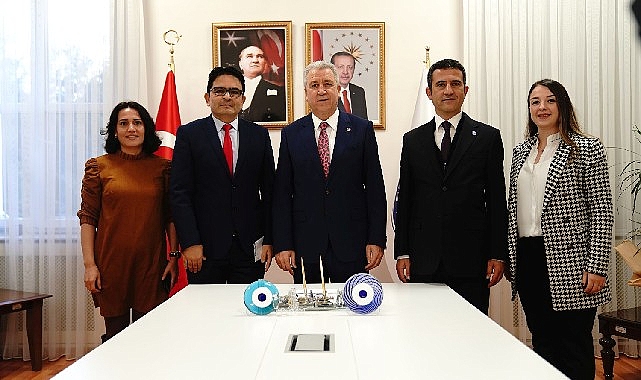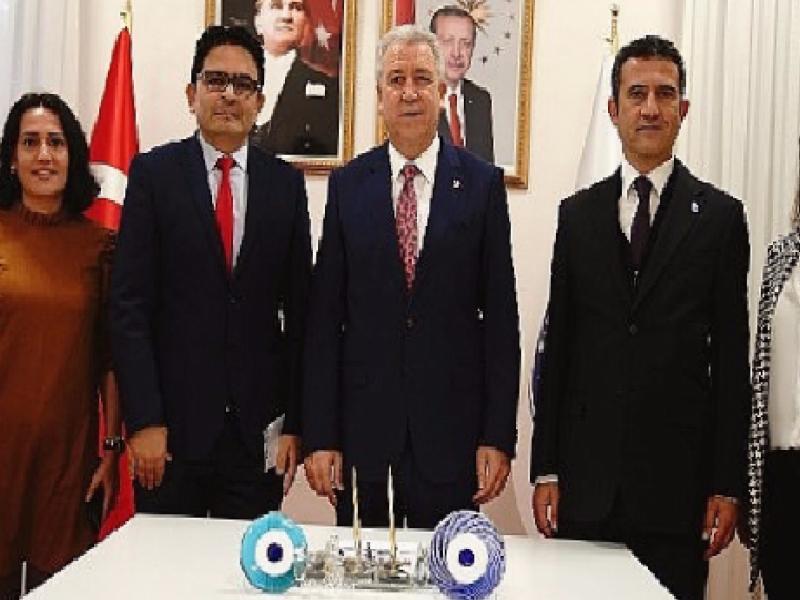
Ege University Atatürk Health Services Vocational School Director Assoc. Dr. The project titled “Increasing the Coping Skills of Pre-Hospital Emergency Health Workers with Aggressive Patients and the Quality of Emergency Medical Care to be Given to the Patient”, led by Ali Ekşi, was entitled to receive support from TUBITAK. The “Physical Restriction of the Aggressive Patient in Pre-Hospital Emergency Health Services Service Protocol”, which will be developed within the scope of the project carried out in cooperation with the General Directorate of Emergency Health Services of the Ministry of Health, will create scientific data that can be used in the updating and development of service standards for 112 Emergency Health Services employees.
Ege University Rector Prof. Dr. Necdet Budak said, “We see that violence has become a health problem that is increasing day by day and concerns the whole society, both at the national and global level. We observe that violence has become life-threatening in the field of health as well as in other fields. Having prepared an important project on violence, which disrupts service efficiency in the health sector and causes psychological and physiological problems in health professionals, Assoc. Dr. I congratulate Ali Ekşi and his team”.
“Healthcare workers are 35 times more likely to be exposed to violence”
Stating that violence is one of the most important current problems that impair service efficiency in the health sector, Atatürk Health Services Vocational School Director Assoc. Dr. Ali Ekşi said, “The risk of exposure to violence in healthcare workers is 35 times higher than in other sectors. Violence in health increases the professional anxiety of the employee, makes them feel insecure, negatively affects their willingness to work and professional performance, and decreases their motivation to work. In addition, it negatively affects patients’ access to quality health care. More than 80 percent of Prehospital Emergency Health Services (HÖASH) workers are attacked once to three times a year. HÖASH workers are exposed to 14 times more injury-related violence than firefighters, which is considered the world’s riskiest profession. A very important part of violence is related to the aggressor patient. Despite the fact that emergency medical intervention to the offending patient has been a topic of discussion for many years, there is very little agreed upon issue yet. One of the most important steps in the emergency medical intervention to the aggressor patient is the restraint of the patient. Most of the time, restraint is necessary so that the patient does not harm himself and the people around him, and emergency medicine and interventions can be administered to the patient. There should be a service protocol that defines appropriate roles and responsibilities in this regard, restraint the aggressive patient, better use of techniques for reducing verbal tension, and better training of the HÖASH staff. In Turkey, there is currently no service protocol regarding the restraint of the aggressor patient and a subject-specific training program for HÖASH staff. This situation often leaves the employee in a dilemma in terms of roles and responsibilities and makes them more vulnerable to attack.”
“Employees will deal more easily with aggressive patients”
Assoc. Dr. Ali Ekşi said, “A 3-stage method will be applied in the project. A mixed research method including qualitative and quantitative methods will be used to determine the current situation and problem areas, a focus group meeting will be held in the development of the service protocol for the restraint of the offensive patient, and a training program on emergency medical intervention for the offensive patient will be developed for HÖASH employees in the light of all the data obtained. This project, which aims to increase the effectiveness of HÖASH, which is needed by the society in emergencies, will contribute to the development of our country’s health service capacity, especially to increase the social capital and institutional capacity to cope with emergencies, and thus to strengthen the problem-solving capacity of the society. Unlike other studies on the subject; The pathophysiology of conduct disorder and other underlying factors will also be covered. The ethical dimension of the issue will also be one of the important topics. The transfer of the aggressor patient to the hospital will also be handled in detail in this project, unlike other studies in the literature.
Emphasizing that the project will be carried out in cooperation with the Ministry of Health, General Directorate of Emergency Health Services, Assoc. Dr. Ali Ekşi said, “The ‘Physical Restriction of Aggressive Patient in Pre-Hospital Emergency Health Services Service Protocol’, which will be developed within the scope of the project, will create scientific data that can be used in the updating and development of service protocols for our country’s 112 Emergency Health Services employees. The ‘Emergency Medical Care Training Program for Aggressive Patient in Pre-Hospital Emergency Care’, which will be developed within the scope of the project, will be of a quality that can be utilized in in-service and post-graduate training programs for our country’s 112 Emergency Health Services employees.
Supported within the scope of TUBITAK ARDEP 3005 – Innovative Solutions Research Projects Support Program in Social and Human Sciences and Ege University Atatürk Health Services Vocational School Director Assoc. Dr. In the project conducted by Ali Ekşi; Atatürk Health Services Vocational School lecturers; prof. Dr. Gulseren Keskin, Assoc. Dr. Süreyya Gümüşsoy, Lect. See. Dr. Sinem Utanır Altay, Lect. See. Dr. Bektas Sari, Lect. See. Sevgi Öztürk, Head of the Department of Psychology, Faculty of Letters, Prof. Dr. Serap Tekinsav Sütcü, Deputy Dean of the Faculty of Education Assoc. Dr. Öner Uslu, Manisa Celal Bayar University Faculty of Health Sciences faculty member Assoc. Dr. Derya Kaylı and Dr. Nilüfer Emen from the General Directorate of Emergency Health Services of the Ministry of Health of the Republic of Turkey are participating as researchers.
Source: (BYZHA) – Beyaz News Agency

